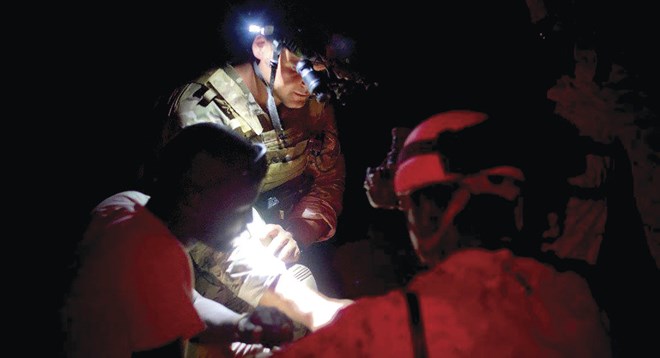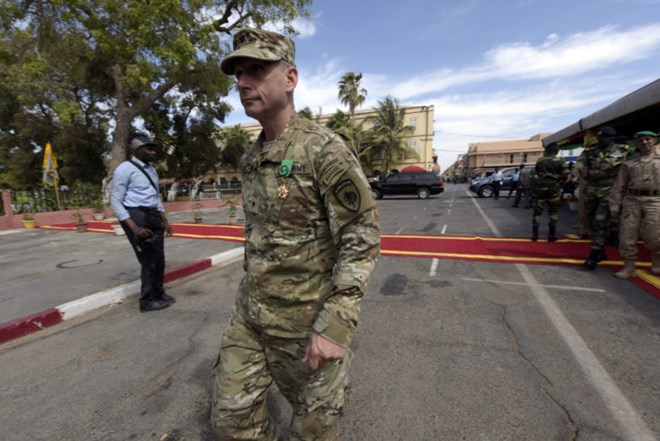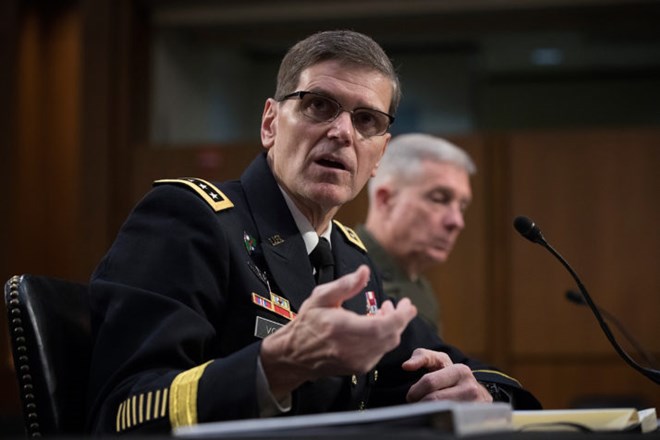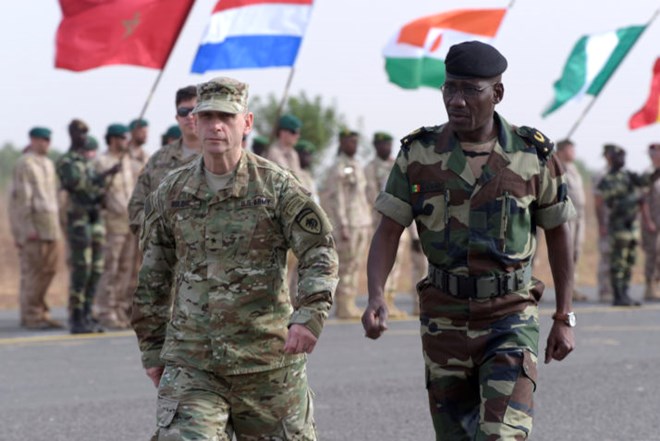
Tuesday July 3, 2018
By Wesley Morgan
Despite Pentagon assertions, secret programs allow American troops to direct combat raids in Somalia, Kenya, Niger and other African nations. 
A U.S. Army Special Forces Operational Detachment Alpha team conducts advanced nighttime marksmanship training at a Nigerien Army range on Sept. 11 along with counterparts from the 1st Expeditionary Forces of Niger. | U.S. Department of Defense
American special operations teams are playing a more direct role in military actions against suspected terrorists in Africa than the Pentagon has publicly acknowledged, planning and participating in combat raids by African troops in multiple countries including Somalia, Kenya, Tunisia and Niger, under a set of classified programs.
In repeated public statements, military spokespeople have said the American role in Africa is limited to “advising and assisting” other militaries. But for at least five years, Green Berets, Navy SEALs and other commandos operating under a little-understood authority have planned and controlled certain missions, putting them in charge of their African partner forces.
Under both the Obama and Trump administrations, the military has relied on partners in other countries to carry out crucial missions against suspected terrorists, to avoid American casualties after years of massive direct involvement in Iraq and Afghanistan. But having Americans plan and retain operational control of the missions gives them greater ability to strike quickly against threats, according to supporters of the programs, even as it shields the true nature of the missions from critics in the United States and abroad.
“It’s less, ‘We’re helping you,’ and more, ‘You’re doing our bidding,’” said one active-duty Green Beret officer with recent experience in West Africa as he described the programs carried out under a legal authority known as Section 127e. Like several other sources interviewed for this story, he spoke on condition of anonymity to discuss classified programs.
“Our special operators not only advise and assist and accompany their partner force, but also direct it under these programs,” acknowledged retired Brig. Gen. Donald Bolduc, who until June 2017 commanded most U.S. special operations forces in Africa, in a POLITICO interview.
“If you’re deployed under this combating terrorism authority, 127e, that’s probably combat” — U.S. Representative Richard Hudson
The role played by American commandos under the authority helps explain the complex events that led to the deaths of four special operations soldiers last October during an ambush in the village of Tongo Tongo in Niger by local militants affiliated with the Islamic State. The team that was ambushed was not operating under the authority, but it had been diverted from its normal mission to support a second team that was.
That second team had been flying across the country to help its Nigerien partner force raid a militant hideout when the first team was redirected to back it up — only to have weather force the helicopters back, leaving the original team in the area on its own, according to an investigation into the incident by the military’s four-star Africa Command.
The authority funds classified programs under which African governments essentially loan out units of their militaries for American commando teams to use as surrogates to hunt militants identified as potential threats to American citizens or embassies. That’s instead of having the American commandos help the African troops accomplish their own objectives, as other U.S. special operations teams do in Africa.
The programs focus on both reconnaissance and “direct action” raids by joint forces of American and African commandos on militant targets, Bolduc and other sources said — a type of mission the Pentagon has previously denied participating in on the continent.
A spokesman for Africa Command declined to say which African states host teams under the authority, but former special operations officers have identified eight countries as current or recent sites of the surrogate programs. They include well-known combat zones like Somalia and Libya as well as more surprising sites for American-directed commando raids like Kenya, Tunisia, Cameroon, Mali and Mauritania — and Niger, where the October mission that ended in tragedy involved one of two units that Green Berets run in the country under the authority.
As the Pentagon scrambled last fall to explain what its fallen commandos had been doing in combat in an African country many Americans had never heard of, it initially withheld some key facts — including that a second team of special operations troops had been involved in the mission too.
More than eight months later, the Africa Command investigation has revealed more details about the role of that second unit, known as Team Arlit after the Nigerien town where it was based. But the Pentagon still refuses to acknowledge the full nature of the mission it was conducting or that it was working under the authority. (Bolduc, a former White House official, and another former special operations officer with experience in northwest Africa all confirmed that in interviews.) Both Africa Command and Special Operations Command declined to comment on any programs run under the authority, saying information about them is classified.
One aspect of the programs that the Pentagon considers sensitive is how close they come to putting the U.S. special operators who plan the missions in harm’s way. Two weeks after the Tongo Tongo ambush, the director of the Pentagon’s Joint Staff, Lt. Gen. Kenneth McKenzie, was asked at a news conference whether any American special operators participated in “direct action” missions alongside African troops — military parlance for raids against suspected terrorist targets. McKenzie had just said that American advisers on the continent were “not directly involved in combat operations,” a statement that reporters in the room were eager to clarify.
“No, we’re not involved in direct action missions with partner forces,” McKenzie answered bluntly.
That statement was incorrect. In fact, as Africa Command said in its subsequent investigation, the mission for which Team Arlit and its Nigerien partners were flying in when weather forced them back was a “multi-team raid” — essentially a synonym for “direct action.”
McKenzie’s characterization was “obviously false,” the former White House official, who has detailed knowledge of special operations programs in Africa, said in an interview. “We are advising those forces on direct action missions, and to say otherwise is lying by omission,” the former official added.
Joint Staff spokesman Col. Patrick Ryder responded that when McKenzie said “direct action,” he meant “U.S. direct combat operations.” Ryder said that Americans troops “operate in Niger to train, advise, and assist Nigerien forces in a non-combat role” but did not dispute that missions in the country include direct action raids.
“There is more of a direct action flavor” to the missions run by teams operating under the authority, said Bolduc, the former commander of special operations forces in Africa. “That’s specifically what it’s supposed to do.”
The chance to go on raids makes supporting one of the secret programs a coveted assignment among commandos deploying to Africa. “Yeah, a 127 echo is a better mission,” the current Green Beret officer said, using the military phonetic jargon for programs run under Section 127e.
“Everybody operates under the same guidelines as far as risk and self-defense and rules of engagement” — Brig Gen. Donald Bolduc
In northwest Africa, teams working under the authority try to track down militants associated with al-Qaeda or the Islamic State who travel on desert smuggling routes between Mali, Libya and Niger, said Bolduc, the former White House official and the second former special operations officer with experience in the region, who also spoke on condition of anonymity to discuss classified programs.
During the second former special operations officer’s tour in Africa, teams on such missions were involved in few actual gunfights, he said — but suicide bombers once attacked the base where one team lived with its Nigerien partner force.
 Brig Gen. Donald Bolduc | Syellou/AFP via Getty Images
Brig Gen. Donald Bolduc | Syellou/AFP via Getty Images
“There is a very deliberate process when we leave the gate. It’s not cowboy shit. We’re trying hard not to be in direct combat unless something really bad happens to our partner force,” he said. Like other special operations teams on more standard advisory missions, teams working under the authority are forbidden from participating in the most dangerous phase of a raid — when the African force actually enters the target compound.
After planning the mission based on U.S. intelligence and getting approval from higher headquarters, the Americans drive or fly with their local partners to the vicinity of the target, where they are required to hang back at “the last position of cover and concealment.” That is the military term for the last place where they can stay out of sight and are protected from gunfire by some sort of natural obstacle. But the former special operations officer pointed out that in the deserts and scrubland of northwestern Africa, “a lot of the time there really isn’t any cover or concealment to be had.”
There, the team “remotely commands and controls” the raid while monitoring feeds from drones and aircraft that eavesdrop on enemy phone calls. Afterward, the Americans move forward to check the raid site for intelligence — or, if something goes wrong during the raid and the African troops need help, they might move forward and join the shooting.
That happens rarely.
“Everybody operates under the same guidelines as far as risk and self-defense and rules of engagement,” whether on a surrogate program mission or a more standard advisory mission, said Bolduc. “I’ve got guys in Kenya, Chad, Cameroon, Niger, Tunisia who are doing the same kind of things as the guys in Somalia, exposing themselves to the same kind of danger, and not just on 127 echoes. We’ve had guys wounded in all the types of missions that we do.”
Representative Richard Hudson (R-N.C.), who represents the area around Fort Bragg where many Green Berets who work in Africa are based, recently introduced legislation seeking a combat zone tax exclusion for all troops deployed on missions under the authority. Hudson said that he supports U.S. military activities in Africa and does not believe the secrecy surrounding them is inappropriate.
“If you’re deployed under this combating terrorism authority, 127e, that’s probably combat,” he said in an interview, explaining that his constituents had described those missions to him as among the most perilous they undertake in Africa, despite the rules mitigating the risk.
“You have these gray lines between what are African operations with U.S. assistance, and what are U.S. operations with African assistance, and what risk profile we’re comfortable with” — Alice Friend, former Obama administration Pentagon official
But Bolduc said that on raids, where special operators take the enemy by surprise and are supported by drones and spy planes, American troops and their partners have advantages that they lack on more routine missions.
“It’s a different kind of danger,” he said. “In some ways these missions are less dangerous than what the team was doing in Tongo Tongo,” a more standard patrol where militants were able to catch the Green Berets off guard, “because you have way more assets dedicated to these missions and control the environment more.”
Even though commanders try to keep American troops out of combat if possible, the missions illustrate the murky nature of who is assisting whom in Africa, said Alice Friend, a former Obama administration Pentagon official who oversaw counterterrorism policy in northwest Africa.
“You have these gray lines between what are African operations with U.S. assistance, and what are U.S. operations with African assistance, and what risk profile we’re comfortable with,” she said. “At what point is it actually a U.S. operation? It’s ambiguous.”
The annual funding for the programs has quadrupled since their inception in Afghanistan, to $100 million — in part thanks to the glowing testimony generals and admirals have given to Congress. Congress has reauthorized the temporary authority every year until last year, when lawmakers made it permanent.
“Congress has seen it as being useful enough to make it a permanent authority,” said Linda Robinson, a Rand Corp. expert on special operations, who noted that even the quadrupled annual funding is still a small sum compared with what the United States spends combating terrorism in full-scale war theaters like Iraq and Afghanistan.
That point has featured heavily in top commanders’ pitches to lawmakers about the programs. Gen. Joseph Votel, who commands U.S. forces in the Middle East — where the programs are also active — and previously oversaw the programs at Special Operations Command, described the programs to Congress as “low-cost, small-footprint, [and] discreet.” He noted that they had led to “hundreds of successful tactical operations … at a fraction of the cost of other programs.”
“Most of these individual programs are $7 [million] to $10 million a year or less. They’re not very expensive,” said the former White House official.
The number of African countries hosting the programs has fluctuated over the years. In 2013, in a development reported at the time by Fox News, a Green Beret team had to end its mission in Libya after militants attacked the partner unit’s camp and stole many of the weapons that the U.S. special operators had supplied under the program.
 Gen. Joseph Votel | Win McNamee/Getty Images
Gen. Joseph Votel | Win McNamee/Getty Images
That program was never reestablished, so in Libya, the U.S. military has since relied on airstrikes and raids by a more secret category of American commandos from Delta Force and SEAL Team 6 — without local partners. Such sensitive, risky missions that put Americans directly in harm’s way are what the programs are supposed to provide an alternative to, as Gen. Thomas Waldhauser, who heads Africa Command, suggested when he testified that the programs provide “high payoff with low risk to U.S. forces.”
Other programs have ended when host countries grew uncomfortable with the arrangement. “The partners who host these programs are concerned about any optics that would make their citizens think the U.S. is using them as puppets in their own countries,” Bolduc said. One such country was Mauritania, which pulled the plug on a longstanding program.
“The host country has to understand what they signed up for, and Mauritania was never comfortable with what they signed up for,” said Bolduc. “It just didn’t fit how the Mauritanians saw themselves, giving up authority over one of their units.”
Friend, the former Pentagon official who oversaw counterterrorism policy in northwest Africa, said such disputes are sometimes unavoidable. “The idea is that they and we both have an interest in the same set of counterterrorism missions, but partner states facing the same threats may define their national security priorities differently than we do,” she said.
But other African governments have embraced the programs. Already home to one surrogate unit, the government of Niger permitted another Green Beret team to stand up a second one, and asked only to be kept “apprised” of the units’ operations, the former special operations source said.
“These programs are not meant to be indefinite, and we have to do them in such a way that the capability can eventually be handed over to our partners once we’ve accomplished the original goal” — Brig Gen. Donald Bolduc
“It works differently in each country,” said Michael Hoza, the former ambassador to Cameroon, where “a handful of SEALs” are helping local commandos hunt the organizers of a Boko Haram suicide bombing campaign. Cameroon’s president reserved the right to approve every mission the SEALs proposed, Hoza told POLITICO, “because he did not want any American casualties in his country.”
Somalia is another willing host, welcoming the ability the units bring to conduct short-notice raids against the al-Qaeda-linked al-Shabab insurgency aboard U.S. helicopters. “All U.S. military activities in Somalia were done with the full support of the Somali government during my tenure,” said Steven Schwartz, the ambassador in Mogadishu until last fall, in an interview.
At the time, according to Bolduc, SEALs ran two separate units under the authority in Somalia. Waldhauser, the general who heads Africa Command, testified to Congress in 2016 that one of those units was “instrumental in recent operations to remove senior al-Shabab leadership.”
Besides the tactical benefits, hosting one of the surrogate programs can be a way for a government to court American support more generally. African governments may agree to host the programs “because it makes their units more effective and allows them to take advantage of U.S. resources and intelligence,” said Andrew Lebovich, a visiting fellow at the European Council on Foreign Relations who studies security in northwest Africa. “But it’s also an easy way to cultivate closer security ties to the U.S. and gain more U.S. support in some cases.”
Special operations forces run 21 programs worldwide under the authority, Thomas, the military’s top special operations officer, testified earlier this year. A few weeks earlier, the deputy assistant secretary of defense who oversees commando missions, Owen West, told Congress that he expects “that the need for these programs will continue, if not grow.”
 Brig Gen. Donald Bolduc with Senegal’s Army General Amadou Kane | Seyllou/AFP via Getty Images
Brig Gen. Donald Bolduc with Senegal’s Army General Amadou Kane | Seyllou/AFP via Getty Images
But people familiar with the programs say it is hard to know how effective they really are — and that some may need to evaluated more harshly and cut back.
Militant groups in Africa “have expanded a little, changed shape a lot, gotten much more bold in their operations” during recent years as U.S. special operations activity against them has become more intense, Friend said. In response, “we simply seem to have thrown more special operations forces at it, but without a wider strategic review.”
Bolduc, whose overall view is that the programs are “pretty darn effective,” nonetheless acknowledged that during his time overseeing commandos in Africa, some of the programs he inherited seemed to have outlived their usefulness, and others were “developing capabilities that couldn’t be sustained.” He cited Somali commandos who became reliant on U.S. helicopter support, which they would not be able to count on once their unit was transitioned back to normal Somali control.
“These programs are not meant to be indefinite, and we have to do them in such a way that the capability can eventually be handed over to our partners once we’ve accomplished the original goal,” Bolduc said.
Robinson, the Rand Corp. expert on special operations, said that while “there is broad agreement that this authority fills a gap” to quickly create African forces that can raid terrorist targets at U.S. behest, “there has to come a time where you judge if a partner isn’t committed or effective and off-ramp them. Some have been off-ramped and perhaps more will be.”
“Once you start these things, they’re hard to turn off. Some of them pan out, and some of them don’t,” said the former White House official. “I don’t think Congress or SOCOM [Special Operations Command] really hold them to account. Nobody’s put the boot on people’s necks to make sure these programs truly are effective.”